
Home » Tips for Teachers » Exploring the Evidence: 7 Comprehensive Reasons Why School Should Start Later for Enhanced Student Well-being and Academic Success

Exploring the Evidence: 7 Comprehensive Reasons Why School Should Start Later for Enhanced Student Well-being and Academic Success
The debate on the optimal timing for school start times has gained considerable momentum, presenting compelling reasons why school should start later. This growing consensus among educators, parents, and researchers highlights the profound benefits such a shift could have on student health and academic performance.

Traditionally, schools have adhered to an early morning schedule, a routine that is increasingly viewed as misaligned with adolescent physiological rhythms and conducive to chronic sleep deprivation. This discrepancy between school schedules and the natural sleep patterns of teenagers has sparked a significant reevaluation of how educational institutions can best support the developmental and learning needs of their students.
Advocating for later start times is not merely a call for more sleep; it represents a holistic approach to enhancing the educational environment by optimizing the physical and mental well-being of students. The argument for delayed start times is supported by a wealth of research indicating improvements in various areas of student life, including academic achievement, mental health, and physical wellness.
Reasons why School should Start Later in the Morning: – Better for students sleep and attendance – Don’t need to stay up as late to do homework because you can do it in the morning — Pisha 🍉 ⪩⚢⪨ Et Le Ena Piou (@mafuanenautism) September 30, 2022
However, transitioning to a later schedule also presents logistical challenges and potential drawbacks, such as impacts on extracurricular activities, family routines, and community infrastructure, which must be thoughtfully addressed.
This article embarks on a comprehensive examination of the subject, exploring the multifaceted benefits of starting school later, the considerations and challenges that come with such a change, and the real-world implications as evidenced by initiatives like those undertaken by the Seattle School District. Through this analysis, we aim to provide a balanced perspective on why the shift towards later school start times could represent a significant step forward in fostering environments that truly cater to the needs and potentials of our young learners.
On this page, you will discover:
- The Benefits of Starting School Later →
- The Potential Drawbacks of Starting School Later →
- The Impact of Delayed School Start Times in Seattle School District →
7 Reasons Why School Should Start Later
Wendy Troxel attributes the lack of sufficient sleep among teens not to Snapchat, social lives, or hormones, but to public policy, specifically early school start times, and shares insights from her dual perspective as a sleep researcher and a mother in a must-watch video on how this affects adolescents during a crucial stage of their lives.
Now, let’s delve into the compelling reasons why school should start later, exploring seven key factors that highlight the benefits of adjusting school schedules for the betterment of student health, engagement, and academic performance.
1. Improves Academic Performance
Adequate sleep is essential for adolescents, who are at a pivotal stage of development and learning. The evidence linking sufficient rest to improved academic outcomes is compelling, suggesting that later school start times could play a key role in enhancing students’ educational achievements.
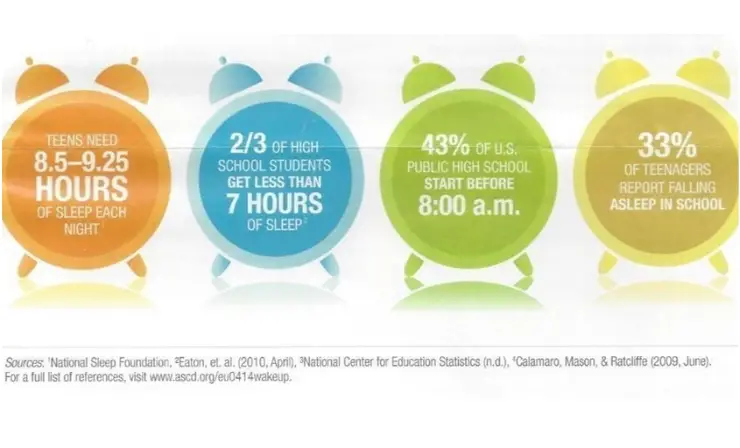
The correlation between adequate sleep and enhanced academic performance is well-documented. Studies by organizations such as the National Sleep Foundation underscore the critical role sleep plays in cognitive functions, including memory retention, focus, and decision-making processes. Adolescents, who are in a crucial phase of brain development, particularly benefit from extended sleep, as it directly influences their ability to learn and excel academically.
A later school start time aligns with their natural sleep cycles, allowing for a more alert and engaged mindset during school hours. This alignment not only fosters an environment conducive to learning but also translates into tangible outcomes such as higher test scores and grade improvements. Consequently, the shift to later start times could serve as a strategic approach to bolster academic success, addressing educational priorities and student well-being in tandem.
Why It Is Important
- Academic success is key for future opportunities, shaping higher education and career paths.
- Enhanced performance from later start times correlates with better cognitive functions: memory, attention, and problem-solving.
- Quality sleep, aligned with circadian rhythms, leads to deeper, more restorative rest, essential for learning and memory.
- Alert, focused students are more likely to actively participate and retain information.
- Benefits individual students and contributes to a positive, productive learning environment.
- Later start times are a strategic approach to enhance educational outcomes and prepare students for success.
Discover in this video how mastering healthy sleep habits can serve as a genuine performance enhancer in the classroom, leading to better sleep and higher GPAs for students.
2. Allows Teens to Get More Sleep
The mismatch between teenagers’ biological clocks and early school schedules is a significant barrier to their health and well-being. Recognizing the critical importance of sleep for this age group underlines the need for adjustments in school start times to support their developmental needs.
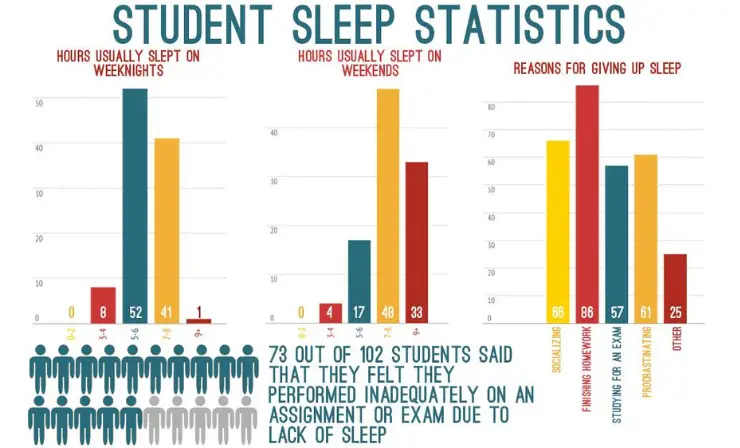
Adopting later school start times harmonizes with teenagers’ biological clocks, addressing the mismatch between early school schedules and adolescents’ sleep needs. The American Academy of Sleep Medicine’s recommendations highlight the importance of adequate sleep for teenagers, a demographic often burdened by early start times and societal pressures that encroach on their sleep duration. This shift not only ensures they meet the optimal sleep quota but also enhances their overall health and cognitive function.
The benefits extend beyond the mere number of hours slept; the quality of sleep improves, fostering better mental, emotional, and physical health. This holistic improvement in well-being is crucial during adolescence, a period marked by significant growth and development challenges.
- Adequate sleep is crucial for teenagers’ physical and mental development, supporting growth, immune response, and emotional regulation.
- Recommended sleep leads to fewer behavioral issues and improved decision-making.
- Important during adolescence, a time of significant development.
- Sufficient sleep is linked to better mood regulation and reduced risk-taking.
- Schools can help teens get the necessary sleep, promoting academic success and well-being.
- Recognizes the link between physical health, mental health, and academic achievement.
Behavioral and social scientist Wendy Troxel explains how early school start times essentially cause daily jetlag for students and advocates for a change in their morning routines in a compelling video worth watching.
3. Reduces Absenteeism
Healthier students are more likely to attend school consistently, underscoring the impact of sleep on immune function and overall wellness. By adapting school schedules to allow for more sleep, educators can directly contribute to reducing absenteeism and enhancing the learning environment.
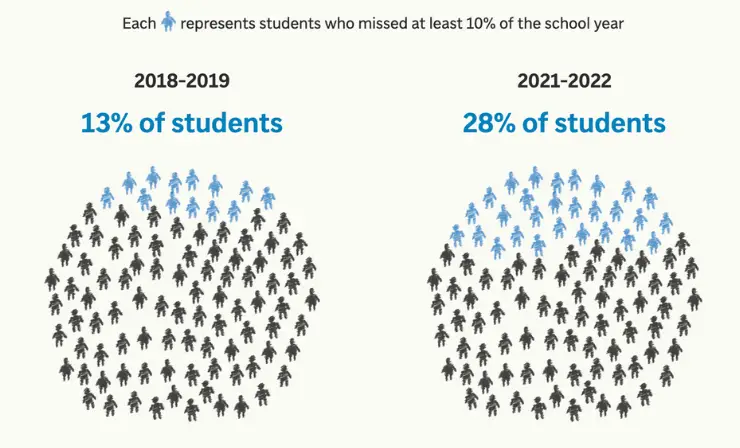
Later school start times contribute to a healthier student body, which directly impacts attendance rates. Sleep deprivation compromises the immune system, making students more susceptible to illness and, consequently, more likely to miss school. By ensuring that students get sufficient rest, schools can see a reduction in absenteeism.
This not only benefits students’ academic performance and continuity of learning but also contributes to a more vibrant, participatory school environment. Improved health outcomes due to adequate sleep thus serve as a preventive measure against common ailments, ensuring that students remain present and engaged in their educational journey.
- Regular attendance is essential for continuous learning and success.
- Each missed day is a lost opportunity for learning and interaction.
- Absenteeism creates knowledge gaps, affecting confidence and curriculum engagement.
- Reducing absenteeism with later start times ensures full participation in education.
- Improves academic outcomes, social integration, and school connectedness.
- Alleviates administrative and teaching challenges, leading to a more efficient educational process.
Matt Pearl explores how what seems like a harmless day off can quickly escalate into habitual truancy, and highlights one school district’s innovative plan to combat this issue and refill empty seats in a must-see video.
4. Lowers Risk of Depression and Mental Health Issues
The crucial relationship between sleep and mental health, particularly in adolescents, cannot be overstated. Addressing sleep deprivation through later school start times is a preventative measure that could significantly improve students’ mental health outcomes.
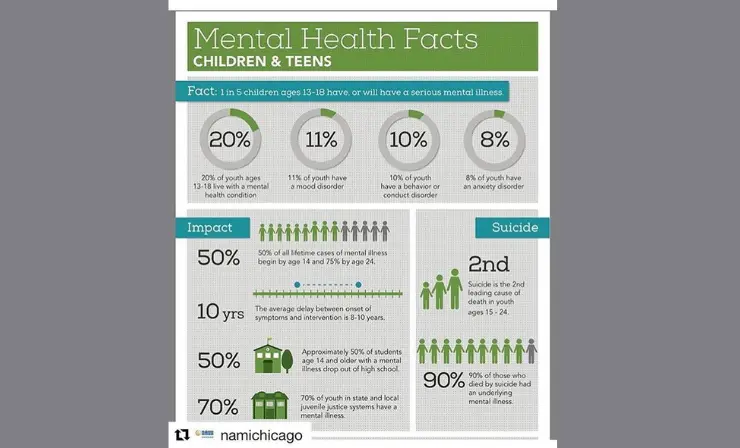
The interplay between sleep and mental health is critical, especially during the volatile adolescent years. Inadequate sleep has been consistently linked to increased risks of depression, anxiety, and other mental health issues. By shifting school start times later, students are afforded the opportunity to align their sleep schedules with their biological needs, significantly mitigating these risks.
This preventive approach to mental health is of paramount importance, considering the rising incidence of mental health challenges among teenagers. Providing an environment that supports adequate sleep can be a fundamental strategy in promoting mental well-being, offering a buffer against the stressors and challenges of adolescence.
- Mental health’s critical role in students’ well-being and success is undeniable, with adolescence being a particularly vulnerable period for the onset of issues like depression and anxiety. Sleep deprivation significantly exacerbates these conditions.
- Ensuring adequate sleep is foundational for robust mental health, enabling students to better manage stress and the myriad challenges of adolescence with greater resilience.
- Schools that implement later start times contribute to a proactive approach to mental health care, leading to a noticeable reduction in the incidence and severity of mental health issues among students.
- This initiative fosters a supportive educational environment where every aspect of student well-being is nurtured, promoting a healthy school climate conducive to learning and growth.
William Brangham delves into why many teens struggle to get the recommended eight to ten hours of sleep, the prevalence of insomnia among them, and the significant impact on their mental health in this insightful video.
Delve into the critical role of mental health in educational success with “ 8 Reasons Why Students Should Have Mental Health Days: A Research-Based Analysis ” offering evidence-based arguments for the integration of mental health days into school policies to enhance student well-being and academic performance.
5. Reduces Drowsy Driving in Teens
With the initiation of driving coinciding with the teenage years, the risk of drowsy driving becomes a pressing concern. Adjusting school start times to ensure teenagers get enough sleep could be a critical step in enhancing road safety and reducing accidents.
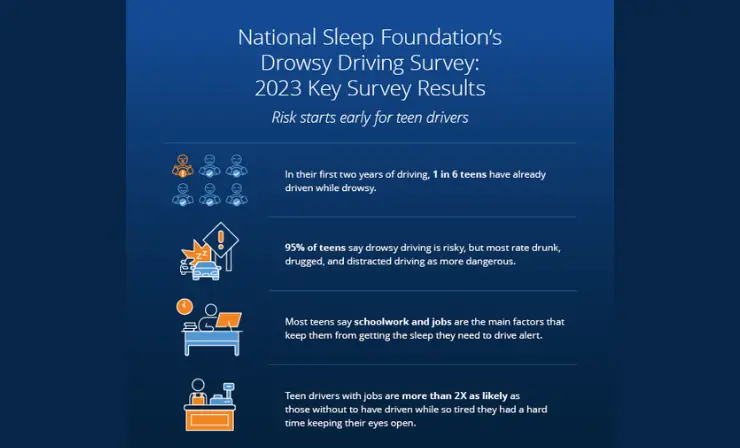
Teenage years coincide with the commencement of driving for many, introducing risks associated with drowsy driving. The CDC has identified sleep deprivation as a key factor in teen driving accidents. By enabling teens to align their sleep schedules with natural rhythms through later school start times, the incidence of drowsy driving can be significantly reduced.
This has the dual benefit of enhancing individual safety and contributing to broader public safety outcomes. Preventing accidents through such measures not only saves lives but also fosters a culture of responsible driving habits among young individuals.
- The safety of teenage drivers is a paramount concern, with drowsy driving posing a significant risk not just to the drivers but to the community at large. The alertness of drivers is crucial and is directly influenced by the amount of sleep they have received.
- By pushing school start times later, we can mitigate the risk of accidents caused by sleep deprivation, significantly enhancing public safety and specifically safeguarding teenage drivers, who are often less experienced and more vulnerable on the road.
- This measure not only prioritizes the health and safety of students but also contributes to the broader goal of ensuring safer roads and communities.
Explore the findings of a new study on teen drivers and the risks of drowsy driving in this informative video recommended for viewing.
6. Helps Teens Feel Happier
Sleep deprivation negatively impacts adolescents’ mood and overall happiness. Schools that adopt later start times can help align students’ schedules with their natural sleep patterns, fostering improved well-being and a more positive school experience.
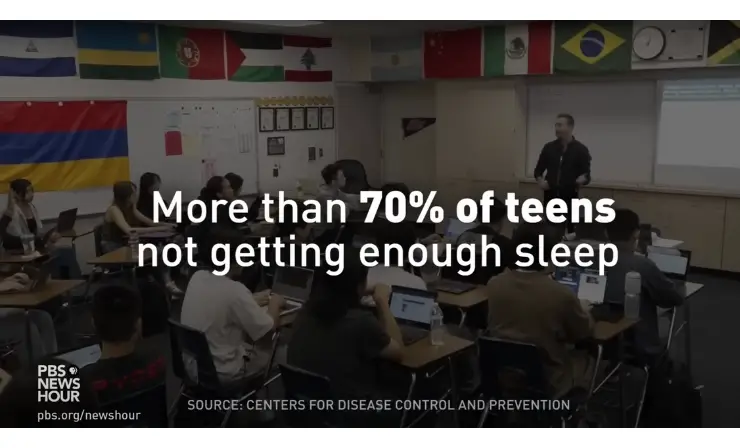
Aligning school schedules with teenagers’ natural sleep cycles can significantly enhance their overall happiness and well-being. The dissonance between early school start times and adolescents’ biological predisposition for later sleep and wake patterns can lead to chronic sleep deprivation , affecting mood and well-being.
By adopting later start times, schools can help rectify this misalignment, allowing students to adhere to a more natural sleep schedule. This adjustment can lead to improved mood, greater resilience, and a more positive outlook on life, which are crucial for healthy adolescent development and academic success.
- The well-being and happiness of students are essential for their active engagement and enjoyment of their educational journey. Students who are well-rested show a marked increase in engagement, curiosity, and motivation.
- By aligning school start times with teens’ natural sleep cycles, there’s a significant improvement in students’ overall mood and outlook on life, which in turn enhances their social relationships and reduces conflict.
- This positive adjustment has been linked to not only a more vibrant school environment but also to tangible improvements in academic performance, demonstrating the deep interconnectedness between emotional well-being and educational outcomes.
Discover how a high school in Dedham, Massachusetts is combating student feelings of hopelessness with an innovative course on finding happiness through savoring experiences and fostering relationships in this inspiring video.
7. Reduced Stress
The stress induced by early mornings and lack of sleep can significantly affect students’ academic and social lives. By moving the start of the school day later, schools can alleviate a major source of daily stress, contributing to a healthier, more conducive learning environment.
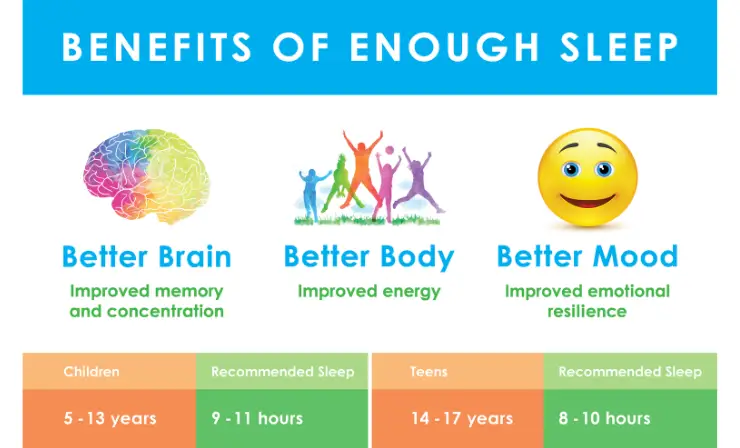
The impact of sleep on stress levels cannot be overstated. Starting school later can significantly reduce the morning rush, a source of daily stress for many students. This reduction in stress can have a domino effect on various aspects of students’ lives, including their academic performance, social interactions, and overall mental health.
By mitigating one of the many stressors in students’ lives, schools can create a more supportive and productive learning environment. The benefits of such a change extend beyond the individual, positively affecting the school culture and community at large.
- Stress stands as a formidable barrier to both learning and mental health, with its ability to impair cognitive function and negatively affect academic performance. The rush and pressure of early mornings contribute significantly to students’ stress levels.
- Adopting a later start to the school day offers students a schedule that is more in sync with their natural sleep patterns, effectively reducing morning stress and allowing for a calmer, more focused start to their academic activities.
- This reduction in stress is beneficial not only for students’ academic performance but also for their mental and physical health, contributing to a more positive, supportive, and productive educational environment.
Discover why starting school later could help teens get the more sleep they need and improve their lives in various ways in this video, addressing common concerns about sleep needs for younger people.
Discover “ 7 Research-Based Reasons Why Students Should Not Have Homework: Academic Insights, Opposing Perspectives & Alternatives ” for a comprehensive analysis of the homework debate, presenting alternative strategies to improve student learning.
The Potential Drawbacks of Starting School Later
1. scheduling sports and extracurriculars becomes more difficult.
The integration of later school start times presents a unique set of challenges for the scheduling of sports and extracurricular activities, which are vital components of a student’s holistic development. The shift could potentially disrupt the delicate balance between academic commitments and extracurricular engagement, affecting students’ ability to participate in these valuable experiences.
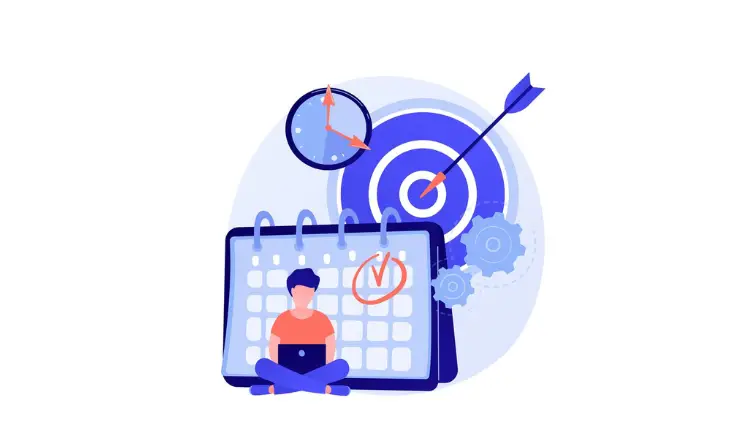
One potential drawback of starting school later is the complication it introduces to scheduling sports and extracurricular activities. Many students are actively involved in after-school programs, including sports teams, clubs, and other organizations that play a significant role in their development. This presents a clear argument for why school should not start later, as it could lead to conflicts with extracurricular activities that depend on fixed schedules. This can result in logistical challenges for both students and program coordinators, potentially causing students to miss out on opportunities that contribute to their growth beyond academics.
In response to this challenge, schools and communities can adapt by rethinking and possibly reinventing the scheduling and structure of extracurricular activities. Flexibility in planning, such as holding some activities in the morning or making more efficient use of weekends, can ensure students continue to benefit from these programs. Moreover, a later start time might actually enhance student participation and performance in extracurriculars, as students would be better rested and more focused, potentially leading to a richer extracurricular experience.
2. Increases Childcare Costs and Logistical Challenges for Working Parents
Transitioning to later school start times poses significant logistical and financial challenges for working parents, necessitating adjustments in childcare arrangements and potentially disrupting daily routines. This change can introduce added stress and financial burden on families, complicating the work-life balance that is crucial for the well-being of both parents and students.

The shift to later school start times can increase childcare costs and create logistical challenges for working parents. Parents may find themselves needing to arrange for additional morning care or adjust their work schedules to accommodate the change. This can add financial strain and complicate the balance between work and family life, creating stress and potentially impacting the overall well-being of families.
However, the community and employers can play a crucial role in easing this transition. Workplaces could offer more flexible working hours or remote work options to accommodate the needs of parents. Additionally, schools and community organizations might develop affordable before-school programs to support families. This approach not only addresses the logistical and financial concerns but also fosters a community-centric solution that benefits both students and their families.
3. May Make After-School Jobs and Activities More Difficult
Adjusting school hours to start later in the day could inadvertently impact students’ ability to engage in after-school jobs and activities, critical for their personal development and financial support. This shift may limit the time available for such commitments, posing challenges for students who depend on the afternoon and early evening hours for work and extracurricular participation.

For students who rely on after-school jobs for income or participate in non-school activities, a later dismissal time can significantly reduce the available hours for work and other commitments. This could affect their ability to support themselves or their families financially and limit their engagement in valuable community or personal development activities.
On the flip side, a later start time can lead to more alert and productive students, potentially making them more efficient in balancing work, activities, and school responsibilities. Schools and local businesses could collaborate to offer flexible working arrangements for students, recognizing the mutual benefits of supporting adolescent development while maintaining their contribution to the workforce and community engagement.
4. Reduces Time for Homework and Family Activities
A later dismissal time from school may compress the window available for homework, relaxation, and family time, essential components of a student’s well-being and academic success. This reduction in available time during the evening can increase stress and limit opportunities for meaningful family interaction and adequate academic preparation.
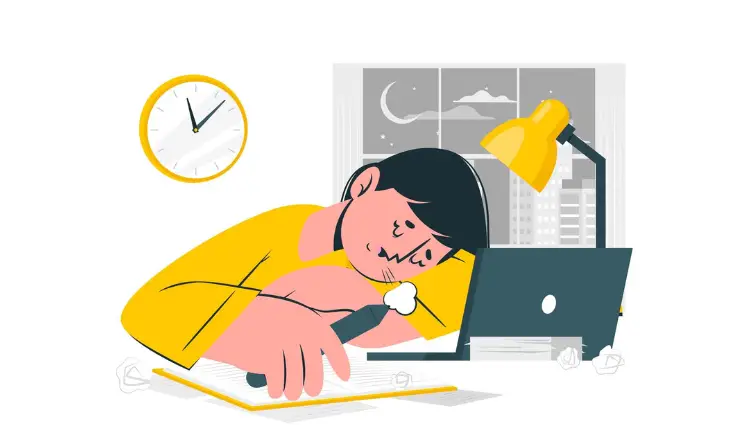
With a later end to the school day, students might find themselves with less time for homework, relaxation, and family activities in the evening. This compression of non-school hours could lead to increased stress, less downtime, and diminished family interaction, which are all important for a student’s well-being and academic success. Uncover persuasive reasons against adopting year-round schooling in “ Comprehensive Analysis: 8 Strong Reasons Why School Should Not Be Year-Round ” highlighting its possible effects on both students and educators.
This challenge necessitates a more efficient approach to homework and after-school time management, potentially encouraging schools to reassess the volume and nature of homework assigned. With strategic planning and support, students can learn to manage their time effectively, ensuring they have sufficient opportunities for both academic responsibilities and family engagement. Additionally, the quality of family time can improve when students are less stressed and more rested, making the time spent together more meaningful.
The Impact of Delayed School Start Times in Seattle School District
In the 2016-2017 academic year, the Seattle School District embarked on a pioneering initiative to address the chronic sleep deprivation affecting its secondary school students. Recognizing the mounting evidence on the importance of adequate sleep for adolescents’ physical, and mental health, and academic performance, the district made a decisive move to delay the start times of its secondary schools from 7:50 am to 8:45 am. This change was aimed at aligning school schedules more closely with students’ biological sleep needs, thereby enhancing their overall well-being and academic outcomes.

Researchers from the University of Washington seized this opportunity to conduct a comprehensive study, both before and after the implementation of the new start times. Their research included students from two public high schools in Seattle, providing a valuable case study on the impacts of such policy changes.
The findings, published in Science Advances, revealed significant benefits stemming from the later start times. On average, students gained an additional 34 minutes of sleep per night, increasing their total nightly sleep from six hours and 50 minutes to seven hours and 24 minutes. This increase brought students closer to achieving the recommended sleep amount and marked a reversal in the century-long trend of gradual sleep loss among adolescents.
The benefits of this policy change extended beyond just improved sleep duration:
- Improved Sleep Duration: The policy change led to longer sleep times for students.
- Enhanced Academic Performance: Observations showed a significant increase in students’ academic achievements.
- Increased Punctuality and Attendance: Notably higher rates of on-time arrivals and attendance, especially in economically disadvantaged schools.
- Narrowing Socioeconomic Learning Gap: The change suggests the potential to reduce disparities in educational outcomes between low and high socioeconomic groups.
- Reduced Daytime Sleepiness: Students experienced less sleepiness during the day, indicating better sleep quality and its positive effect on daily engagement and functioning.
Dr. Tara Narula reports on a Seattle school district that transitioned to a later start time, showcasing the positive outcomes of the study, making it a highly recommended video to watch for insights on the impact of such changes.
Despite the success observed in Seattle, such shifts in school start times remain relatively rare across the United States, where the typical start time still hovers around 8 a.m. However, the Seattle School District’s experience stands as a compelling testament to the benefits of later start times, supported by the American Academy of Pediatrics’ advocacy for this change as an effective countermeasure to the widespread issue of sleep deprivation among teenagers.
The Seattle School District’s initiative demonstrates a proactive approach to student health and education, providing valuable insights and evidence for other districts contemplating similar adjustments. By prioritizing the sleep needs of students, the district not only improved their academic and health outcomes but also set a precedent for the importance of aligning educational policies with scientific research on adolescent well-being.
Useful Resources
- Time Management Activities For High School Students
- Daily Routine For Students: Recommendations And Techniques
- How to Reduce Student Stress and Excel in School
Final Thoughts
The conversation surrounding delayed school start times is complex, yet the evidence, especially from the Seattle School District, provides clear reasons why school should start later, highlighting the potential for significant positive changes in student well-being and academic success. As education stakeholders consider the future of school schedules, balancing the advantages with logistical concerns will be crucial. Ultimately, the goal is to create educational environments that best support the development and achievement of every student.
- How Would Later School Start Times Affect Sleep?
- Sleep is key to help teens recharge for success this school year
- 4 Benefits of Later School Start Times
- Teenagers and sleep
- Drowsy Driving: Asleep at the Wheel
- School Start Times for Adolescents
- Later School Start Times More Popular, But What Are the Drawbacks?
- Students can benefit from starting school later – study
- Recent Posts

Simona Johnes is the visionary being the creation of our project. Johnes spent much of her career in the classroom working with students. And, after many years in the classroom, Johnes became a principal.
- 28 Exciting Yarn Crafts for Preschool Kids: Igniting Creativity and Fine Motor Skills - April 29, 2024
- 16 Engaging and Educational Cause and Effect Activities for Preschoolers to Boost Cognitive Development - April 24, 2024
- 25 Innovative and Engaging Parts of Speech Activities for Middle School: Fun Grammar Games to Enhance Learning - April 14, 2024
Leave a Comment Cancel reply
Save my name, email, and website in this browser for the next time I comment.


TED is supported by ads and partners 00:00
Why school should start later for teens
- social change
- personal growth
Argumentative Essay Example: School Should Start Later
Sleep deprivation. Fatigue. Lower grades. These are effects that students can have due to school starting early. Students need sleep to perform well in school. As late as the 1950's and 1960's, most U.S. schools started between 8:30 a.m. and 9 a.m. This start time can improve students mentally, as they will have more time to sleep, so they can perform better academically and have a better mood. In 2019, California's governor, Gavin Newsom, placed some restrictions on what time schools start at. This bill, known as Senate Bill 328, does not allow middle schools to start before 8 am, and does not allow high schools to start before 8:30 a.m. School should not be able to start before 9:00 a.m, because it can allow students to get more sleep, and students who tend to get less sleep have been linked to many negative effects, such as lower grades, depression, and sleep deprivation.
All public schools should not be able to start before 9:00 a.m because many negative effects have been linked to students when their school starts earlier. For example, according to Amy Norton, many studies have been done that show that students suffer from many things because of school starting too early. “Studies have linked kids' sleep deprivation not only to poorer school performance, but also to higher rates of car accidents, obesity and depression. In a recent study of eight U.S. high schools that delayed their start times, researchers found improvements in kids' grades, attendance and car crash rates” (Norton). These studies show that many negative effects have been linked to kids who have a later school start time, and show better effects on kids when their high schools delayed their start times. According to Eric Suni, many studies have been done that show that students get sleep deprivation from their school start times, and sleep deprivation leads to many other negative effects that can interfere with academics, and the students’ personal life. “Countless studies have shown that early school start times are associated with students getting less sleep, which negatively affects student academic performance. Students with less sleep have difficulty paying attention in class and are likely to have lower grades. They may also experience irritability and fatigue” (Suni). The author states how many students who get less sleep will have many negative effects on them related to school, therefore school should start later so students can be more well rested and ready to learn for the day, and not experience anything such as worse grades, irritability, fatigue, and much more.
Not all agree that school should not be allowed to start before 9:00 a.m. Some people may say that school should start earlier, But according to Dr. Gellner, who is a doctor in the University of Utah, states, “They don't really mean to be so tired, but their body just isn't ready to wake up at such an early time. Getting enough sleep is hard for a teen whose natural sleep cycle makes it difficult for them to fall asleep before 11 p.m. and who face a first period class at 7:30 or earlier the next day. In a new policy statement, the American Academy of Pediatrics recommends that middle and high schools delay the start of the classes till 8:30 a.m. or later. Doing so will align school schedules with the biological sleep rhythms of adolescents whose sleep cycles begin to shift up to two hours later at the start of puberty” (Gellner). This shows that many teens need school to start later, due to their new biological sleep cycle. If school started earlier, they would be too tired, and most likely get sleep deprived. If school started later, they could adjust to their new sleep schedule biologically, and be well rested to go to school each day, and perform well.
All public schools should not be allowed to start before 9:00 a.m for many different reasons. All public schools should not be able to start before 9:00 a.m because many negative effects have been linked to students when their school starts earlier. Earlier starts can lead to students having sleep deprivation, which can lead to things like substance abuse, lower grades, fatigue, depression, and much more. Some may say that school should start earlier, because students can still achieve good grades with an earlier school start time. However, most teenagers need an average of 8-10 hours of sleep. If they don’t get this much sleep each night, they can get sleep deprived, and have many more negative effects. School can already be
tiring, but starting school early will just create more of a negative mental effect on students. Teenagers need a certain amount of sleep each night, and if they don’t meet the recommended amount every night, they can experience many effects that can interfere with their academic performance, and their mental health. School should start later, so every student can get enough sleep each night, and perform well academically in school.
Related Samples
- The Dive into One’s Own Art
- Later School Start Time Essay Example
- Negative Effects of Reading Essay Sample
- English 112 Course Review
- Brock University SWOT Analysis Example
- Persuasive Essay Sample: Cell Phones Should Be Allowed In School
- Persuasive Essay Sample on Hairstyle in School
- Admission Essay Example: National Honor Society
- Persuasive Essay Example: Grades Should Be Eliminated in College
- Persuasive Essay Example about Increasing the Revenue of Professors
Didn't find the perfect sample?

You can order a custom paper by our expert writers
The New York Times
The learning network | should the school day start later.

Should the School Day Start Later?

Questions about issues in the news for students 13 and older.
- See All Student Opinion »
Could letting teenagers sleep later in the morning do more than just make them happy? New evidence suggests that a later start to the school day could have all sorts of benefits, like better grades and fewer car crashes. But some worry that pushing the school day back might get in the way of after-school sports and jobs, and wouldn’t leave students enough time to finish homework.
Should the school day start later?
In “To Keep Teenagers Alert, Schools Let Them Sleep In,” Jan Hoffman writes:
Jilly Dos Santos really did try to get to school on time. She set three successive alarms on her phone. Skipped breakfast. Hastily applied makeup while her fuming father drove. But last year she rarely made it into the frantic scrum at the doors of Rock Bridge High School here by the first bell, at 7:50 a.m. Then she heard that the school board was about to make the day start even earlier, at 7:20 a.m. “I thought, if that happens, I will die,” recalled Jilly, 17. “I will drop out of school!” That was when the sleep-deprived teenager turned into a sleep activist. She was determined to convince the board of a truth she knew in the core of her tired, lanky body: Teenagers are developmentally driven to be late to bed, late to rise. Could the board realign the first bell with that biological reality? The sputtering, nearly 20-year movement to start high schools later has recently gained momentum in communities like this one, as hundreds of schools in dozens of districts across the country have bowed to the accumulating research on the adolescent body clock. In just the last two years, high schools in Long Beach, Calif.; Stillwater, Okla.; Decatur, Ga.;, and Glens Falls, N.Y., have pushed back their first bells, joining early adopters in Connecticut, North Carolina, Kentucky and Minnesota. The Seattle school board will vote this month on whether to pursue the issue. The superintendent of Montgomery County, Md., supports the shift, and the school board for Fairfax County, Va., is working with consultants to develop options for starts after 8 a.m.
Students: Read the entire article, then tell us …
— What time does your school day start and end?
— Should your school day start later? Or do you like your daily schedule?
— Is an early start time leaving you sleep deprived? Are you staying up later than you should?
— What do you think the most important benefits of a later start time would be? What might the disadvantages be?
— What do you think about the campaign that Jilly Dos Santos led in her district to push back the high school start time?
Students 13 and older are invited to comment below. Please use only your first name . For privacy policy reasons, we will not publish student comments that include a last name.
Comments are no longer being accepted.
The school day should start at 8:15 and end at 3:00 because that gives you enough time to get up and get refreshed for the day before you go to school. My school starts at 7:45 and its just too early and I rarely ever take in the information from my 1st period class. Since my school does start early, even if I go to bed early, I constantly feel sleep deprived and sluggish. The advantages to a later start time would be that you take in more information in the mornings and that you are fully rested so you can go throughout your day with a positive upbeat attitude.
Our school in Sweden starts earliest 8:30 a.m. and ends latest 4:30 p.m. I like my daily schedule, because if you start your school day later, that means that you will get home later. When you get home later you don’t have much time to do anything. An early start is leaving me sleep deprived, because I always end up going to sleep late at night. But I still manage school, I wait until the weekend to sleep longer.
The most important benefits of a later start time is that you get to sleep longer, and some people who has a hard time waking up in the morning, has a better chance at making it to class. The disadvantages can be that you come home later.
I think the campaign that Jilly Dos Santos led was a great idea. I think it’s horrible how a school can start as early as 7:20. I think she did good… She fought for what she thought was right.
i think its a bit of a personal problem because at Fork Union Military Academy we have 20 minutes to do our stuff when we wake up at 6 a.m. We are then ready to take on the day later
My class day starts at 8:00 and ends at 2:00. I like my class schedule. An early start would not leave me sleep deprived as long as I can get my homework done earlier and go to sleep earlier. At my school, a later school time would be allow more sleep. A benefit would be shorter practice times and later school end times. It is good that she actually accomplished it.
I think it would be a great idea to push the starting time for school so that students may have a full sleep, thus performing well in class.
My school starts at 8:00 and ends at 2:00. I don’t have a problem with the time school starts. Yes I stay up later then I should and when I wake up I am weak and really tired. The advantages of a later school start time would be the student can take his time on his homework at nights and the disadvantages would be kids would stay up later than they should. I think the campaign is straight stupid! I go to Fork Union Military Academy and I have 20 mins to get ready in the morning and that girl doesn’t have to put make-up on…. It is all in time management! If she uses her time wisely then she would be all good!
My school day starts at 8AM and ends at 2PM. Personally, i think the school day should start a bit later. I feel like I’m lacking the rest i need during the day. Because of the military academy environment, we have to go to sleep at 10PM and wake up at 6AM, and i still feel sluggish in the morning. I can already see the benefits of waking up later, because on weekends, we are allowed to wake up at 7AM, and many times i will feel well rested and even sometimes be able to wake up before 7AM. I could see a disadvantage of waking up at 7AM on school days because I’m sure that the school would require you to stay an hour after class because you’d be coming to school an hour later. I think the extra time to sleep in would be extremely beneficial to the grades of students because they would be able to concentrate more during class, remember things better than they would, and just have a better mood because they were fully rested.
In my opinion my school need to increase the number of hours that we sleep. I wake up a 6 am and sleep at 10 pm. I feel tired during the class day sometimes and cannot focus. My rest has been getting in the way of my grades and I just want my school to let us sleep for 9 to 10 hours instead of 8.
1. My school day starts at 8 am 2. I think my school day should start at a later time, because I think we need more sleep. I think we get out at a reasonable time, but we need to preserve sleep. 3. I am sleep deprived because of how late I go to bed, due to the amount of work I have, and have to wake up very early. 4. I think advantages would be that kids would be more awake and attentive, giving them a chance to do better in school. A disadvantage would be that kids may not get out of school until later in the afternoon. 5. I feel like it is a good idea for both physical health and educational benefit. On the idea that she doesn’t have enough time, I think that is silly. I only have 20 minutes to get ready for class in the morning
I think, like most public schools around Central Virginia, school should start at around 8:30-9:00 and end at around 3:30. My school day starts at 8:00 and ends at 2:00 but I go to boarding school so I don’t have to walk far or drive. I like my schedule because at 2:00, my day is over until I do my homework at 8:00 pm. I can relate to how hard it is to be at school early, but I have to do it. I go to bed at 10 pm get up at 6:00 and have no problem getting ready in 20 minutes. I feel like, if you cannot get to school on time, that is your problem because you should go to bed earlier and get up earlier to allot more time. I understand the whole homework deal, but don’t try to pretend like you (as a public school kid) don’t have enough free time.
My school day starts at 8 and ends at 2 on Mondays through Thursdays, and ends at 12:30 on Friday. I think the day should start at 9-9:30 in the mornings. Early start times are what leave most people sleep deprived but they should just make the decision to go to bed earlier. I think that there would be several benefits from later start times, one including being more focused in class and getting better grades. disadvantages include that some would just stay up later and it would all be relative because they would still not be getting enough sleep. I thought that Jilly had the right idea.
Since I go to a boarding private school, we have a different schedule. We wake up at 6 a.m, have 20 minutes to get dressed, by 6:20 we’re going to breakfast and eating until 7. Then we go back and clean until 7:50. At 7:50 we have 10 minutes to get to class. Our days are from 8:00 a.m until 2:00 p.m with three 45 minutes breaks throughout the day. Later on that day we have a mandatory study hall at 7:45 p.m until 9:40 p.m and then we go to bed at 10:00. I don’t believe we receive enough sleep each night because between school, sports extra curricular activities, and clean-ups, I don’t believe eight hours is enough.
In my opinion, I don’t think schools should start later. My school starts at 7:30 and goes to 2:15. I like my schedule because I get home earlier, so I have more time to do what I want. If schools set their start times back, it wouldn’t make students less tired, it would just be one less hour of daylight after school. Plus, would students really get more sleep? This is just an excuse to stay up later every night. I’ve experienced early and late start times, and I definitely like the earlier times better.
My school starts at 7:10 and ends at 2:20. I don’t really know if it should or shouldn’t. I kind of like my daily schedule. I can’t tell if it is making me sleep deprived. Sometimes but not all the time. I don’t really know any. I don’t know. I don’t agree with that at all.
Should school start later? I think yes. I mean not to late just like an extra hour maybe like 9 a.m instead of 7 a.m. I think that would be best for everyone.
My typical school day starts at 7:15 and ends at 2:20. I think our school day should start later because I wake up at 5:00 in the morning just for school. I do not like it at all!! I am so not an early person so I do not like waking up at 5:00 every single day. I think an early start time is not leaving me sleep deprived, I just do not like waking up that early. I do not stay up later than I should, I just like laying in my bed because it is comfortable and when I am laying down it feels better to my back that is messed up. So I think that school should start later than it does for us.
My school starts at 7:15 and ends at 2:20. I would love to have my school start later, but it would get in the way of homework and jobs. I go to bed every night at a decent time, but the time that I wake up in the morning leaves me with only about six hours of sleep, which can be hard to deal with on some days. The benefits of starting school later would be being happier and feeling better and more alert, while the disadvantages would be less time for homework and a job. At my school there is time to get work done that could otherwise be homework, so with that it would not hurt to start school an hour or two later. There are still other things to consider, like jobs, home chores, and on some nights excess homework. It really depends on the school and the students, but I don’t think that changing the hours would be a bad thing.
Should school days be shorter?
Well should school days be shorter I don’t know should they? Yes school days should be shorter why because students can have hard times sitting all day and trying to follow directions. The affect it has on students can possibly be insubordination, nausea, and later health problems. Taking too much information in the human brain causes stress and multiple headaches. By the way stress speeds up the aging process if you didn’t know and having stress on a young age is not good. I can wright a hole essay about this will this ever make out to people and have them to actually care no. I am sorry for some of my punctuation but whatever its life no one’s perfect. The real reason to having shortened days relies on the people who have the right to chance it. I writing this essay will not solve anything but hopefully it does. School days should definitely be shorter students like I need more time to work on life I spend 7 hours every day even weekends worrying about school. Being an adult makes no difference than being a student or child cause one day we will be capable of doing the same things that’s just logic. The board of education expects all kids that go to school deal with it well that’s not going to happen. Even teachers complain on their free time and budget its funny cause I know they’re at least getting paid 600$ a week. Not just making school shorter but make a new industry and a new world on earth. That won’t even happen either because the economy is so messed up. 2014 people care more about their technology than their selves. If I don’t win this contest its okay I just want you guys know I put an effort into what I’m saying, and if you don’t like it I’m sorry I’m just expressing my feelings. Maybe there will be a day the world will be completely peaceful but we have a lot of work to do. So I really hope you people enjoy this piece of writing thank you.
Sincerely, Dante Y
yes school days should start later because your brain does not start functioning until after 10:00.
well seeing as my school was on a two hour delay today, i don’t care. But i like the way my school is now, it starts at 7:15 and ends at 2:20.
I feel that the school day should start a lot later so that we can actually get something done in our classes instead of being extremely tired by fourth block
Most Definitely. I do think that school should start at a later time. At least like an hour or so starting at 8. I think that by doing this it would make a lot of people happy especially me.
i feel the school day should begin 9:15 am instead of 7:15 and operate on the 2 hour delay schedule. The stress of waking up early leaves me sleepy throughout the day and i think sleeping in at least another hour could help everyone.
My school day starts at 7:10 and ends at 2:20, i like my daily schedule because it gives me time for sports and then i can do things like homework or watch tv after that. If we started any later it would only benefit people that didn’t do sports and hurt the athletes. I think the only reason people want more time is because they go to sleep late and that’s their problem.
My school starts at 7:15 every morning and it ends 2:20. I think it should and I don’t really like daily schedule. What I like it we have about one hour for lunch. It gives me the opportunity to eat and go to my class to get help. It not that deprived to wake up early. I go to sleep on time every day. I think it will benefit the student in their grades.

What's Next
Home — Essay Samples — Education — Starting School Later — Why Should School Start Later: Negative Effects of Early School Start
Why Should School Start Later: Negative Effects of Early School Start
- Categories: High School Starting School Later Student
About this sample

Words: 1679 |
Updated: 3 November, 2023
Words: 1679 | Pages: 4 | 9 min read
Table of contents
Introduction, why should school start later, works cited, video version.
- Carskadon, M. A., & Acebo, C. (2002). Regulation of sleepiness in adolescents: update, insights, and speculation. Sleep, 25(6), 606-614.
- Centers for Disease Control and Prevention. (2015). Schools start too early. Retrieved from https://www.cdc.gov/features/school-start-times/index.html
- Danner, F., & Phillips, B. (2008). Adolescent sleep, school start times, and teen motor vehicle crashes. Journal of Clinical Sleep Medicine, 4(6), 533-535.
- Gruber, R., Somerville, G., Enros, P., Paquin, S., Kestenberg, J., & Carrier, J. (2016). Sleep efficiency (but not sleep duration) of healthy adolescents is greater with later school start times. Sleep, 39(2), 349-356.
- Hagenauer, M. H., Perryman, J. I., Lee, T. M., & Carskadon, M. A. (2009). Adolescent changes in the homeostatic and circadian regulation of sleep. Developmental Neuroscience, 31(4), 276-284.
- Minges, K. E., & Redeker, N. S. (2016). Delayed school start times and adolescent sleep: A systematic review of the experimental evidence. Sleep Medicine Reviews, 28, 86-95.
- Owens, J. A., Belon, K., & Moss, P. (2010). Impact of delaying school start time on adolescent sleep, mood, and behavior. Archives of Pediatrics & Adolescent Medicine, 164(7), 608-614.
- Paruthi, S., Brooks, L. J., D'Ambrosio, C., Hall, W. A., Kotagal, S., Lloyd, R. M., ... & Wise, M. S. (2016). Recommended amount of sleep for pediatric populations: a consensus statement of the American Academy of Sleep Medicine. Journal of Clinical Sleep Medicine, 12(6), 785-786.
- Wahlstrom, K. L., & Dretzke, B. (2009). Changing times: Findings from the first longitudinal study of later high school start times. NASSP Bulletin, 93(4), 1-22.
- Wheaton, A. G., Ferro, G. A., Croft, J. B., & School start times and insufficient sleep among high school students—United States, 2015–2017. (2018). Morbidity and Mortality Weekly Report, 67(3), 85-90.

Cite this Essay
Let us write you an essay from scratch
- 450+ experts on 30 subjects ready to help
- Custom essay delivered in as few as 3 hours
Get high-quality help

Prof. Kifaru
Verified writer
- Expert in: Education

+ 120 experts online
By clicking “Check Writers’ Offers”, you agree to our terms of service and privacy policy . We’ll occasionally send you promo and account related email
No need to pay just yet!
Related Essays
7 pages / 3008 words
4 pages / 1635 words
3 pages / 1514 words
1 pages / 554 words
Remember! This is just a sample.
You can get your custom paper by one of our expert writers.
121 writers online
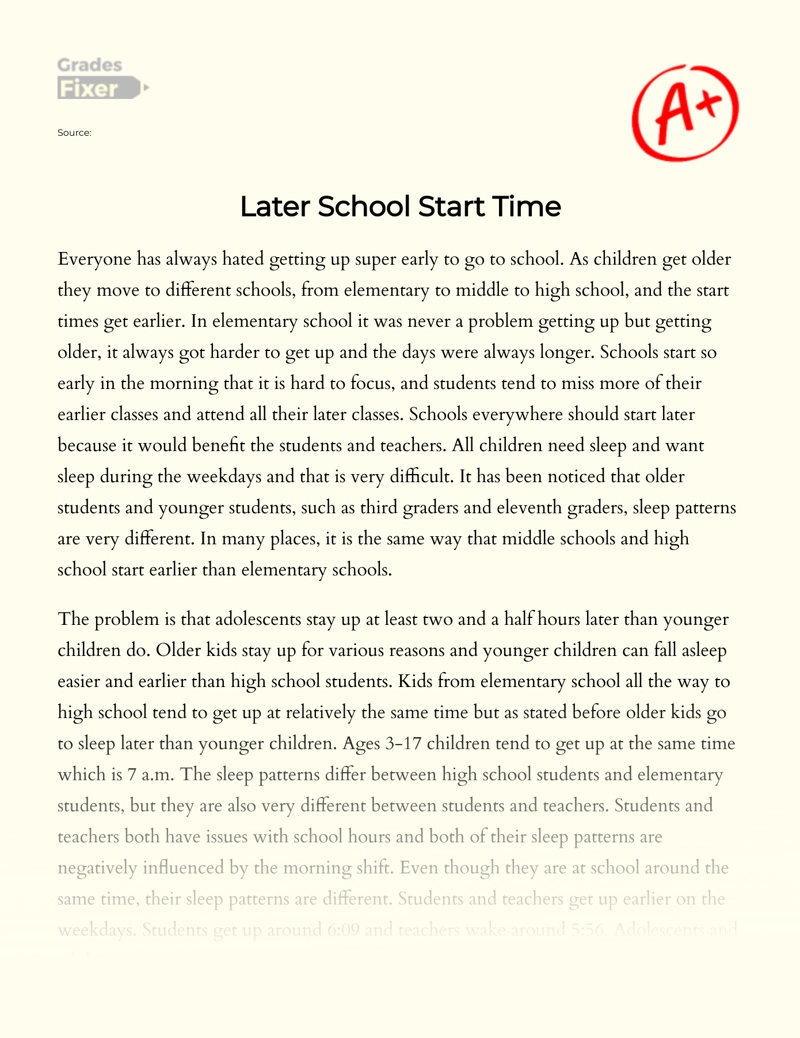
Still can’t find what you need?
Browse our vast selection of original essay samples, each expertly formatted and styled
Related Essays on Starting School Later
The issue of school start times has been a topic of debate for many years, with arguments on both sides of the issue. While some argue that starting school later would allow students to get more sleep and perform better [...]
Should school start times be later in the day or should they be earlier? If kids don't get enough sleep can it affect kids performance in school and sports? Not getting a enough sleep is common among students and is among many [...]
In a society where more is expected from teenage students and schoolwork is harder than that from generations before, it is necessary for the school day to start and end at later times. Early start times have created negative [...]
Literacy is vital to a better quality of life as well as a source of power. Without it, people would not have a practical way to record and share wisdom and ideas for prosperity. Literacy gives people power to unlocking [...]
The Constitution of 1917 created a clear demarcation between the policies before the Mexican Revolution and the policies after the revolution. Prior to the Constitution of 1917, the policies formulated by the Mexican government [...]
In a very broad sense, cheating involves betraying a partner’s expectations about the type of contact the cheater has with others. When a husband or wife, boyfriend or girlfriend, violates one’s expectations about what is [...]
Related Topics
By clicking “Send”, you agree to our Terms of service and Privacy statement . We will occasionally send you account related emails.
Where do you want us to send this sample?
By clicking “Continue”, you agree to our terms of service and privacy policy.
Be careful. This essay is not unique
This essay was donated by a student and is likely to have been used and submitted before
Download this Sample
Free samples may contain mistakes and not unique parts
Sorry, we could not paraphrase this essay. Our professional writers can rewrite it and get you a unique paper.
Please check your inbox.
We can write you a custom essay that will follow your exact instructions and meet the deadlines. Let's fix your grades together!
Get Your Personalized Essay in 3 Hours or Less!
We use cookies to personalyze your web-site experience. By continuing we’ll assume you board with our cookie policy .
- Instructions Followed To The Letter
- Deadlines Met At Every Stage
- Unique And Plagiarism Free
- Writing services
- Proofreading
- Math/Science
- Copywriting
- Dissertation services
- Admission services
- Our Writers
Persuasive Essay About Why School Should Start Later

Table of contents:
- Introduction
- Body paragraphs
It’s one of the favoured topics among high school students. You’re tired. After being up late last night, your school day started at 8:30 am this morning, and you want to know if anything can be done about it. Or perhaps you’re an early bird and like the time that school starts in the morning. Well, you can write a persuasive essay, and maybe if it’s good enough, your voice will be heard, either way.
Start off by taking a firm stance with your thesis statement. Whether you feel school should start later in the morning, or should not, you need to figure out why, and the reasons and benefits (or negatives) in your own mind, first of all. Make a quick outline with your statement of purpose at the top, followed by each point you want to make and the evidence you are going to use to support each point. Remember that you can use any evidence you like in a persuasive essay; it need not be restricted to facts and figures, but can be anecdotal, emotive, or statistical. Think of yourself as a politician trying to persuade an audience to vote for him or her.
Introduction examples
Pro: It’s been proven in many studies that teenagers do better with a later start to the day. With this in mind, why do we still start school at 8:30 in the morning?
Con: Starting later in the day at school interferes with parents’ working days, encourages students to stay up late, and would cause problems with after-school practices for sports.
Moving on into the body of your essay, carry on following your outline, setting up each point and presenting your evidence as you go. Have a look at potential titles, too, which should be reflective of your thesis statement.
Body paragraphs examples
Pro: Teenagers in high school should start at about 10 am. This would allow for a leisurely morning, making the day start off less fraught and stressful. A teenager could stay up until midnight or 1 am and still get a decent amount of sleep, which doesn’t happen when they have to wake up at 6:30 or 7 am. Traffic, too, will be more spread out, easing congestion, and students can take the time to get a good breakfast and be really mentally prepared for the day.
Con: Parents worry about getting themselves to work on time even when school starts at 8:30. A lot of working days would have to change significantly for people to get to work on time if high school started at 10 am instead. This could lead to large amounts of business disruption, and possible discrimination against parents for needing more flexible working hours.
Your conclusion is your last chance to leave an impression on your audience, so make it significant and meaningful. Start by briefly reiterating what your points were, and finish with a bang by calling on your audience to take some action in response to your essay.
Conclusion examples
Pro: Starting later results in benefits for teachers, benefits for students, and also for parents. Think about how rested you’d feel if you had a full eight hours or more sleep each night, and how much more you could get done in your day.
Con: A later school start will throw Australian cities into chaos and maybe even cause some parents to face consequences at work. The way things are now is fine, and there’s no need to fix what isn’t broken.
- Essay samples
- Infographics
- Essay writing
- Crafting a Powerful Essay on Political Polarization
- Oral Health Overview Essay: Preventing Tooth Decay in Australia
- How to Write a Good Expository Essay About Macbeth
- How to Write An Expository Essay About Love
- How to Write a Great Expository Essay About Life
Price per page
Total price:
Limitless Amendments
Bibliography
Plagiarism Report
Get all these features for A$93.12 FREE
If you don't know exactly what type of paper you need or can't find the necessary one on the website - don't worry! Contact us and we'll help you out!
- Terms of Use
- Money Back Guarantee
- Cookie Policy
- Privacy Policy
- Write My Essay
- Custom Essay
- Essay Writer
- Do My Essay
- Type My Essay
- Pay For Essay
- Cheap Essay
- Write My Paper
- Write My Assignment
- Assignment Writer
- Buy Assignment
- Assignment Help
- Do My Assignment
- Nursing Essay Writing Service
- Management Essay
- Business Essay
- Law Essay Writing Service
- Education Essay Service
- Marketing Essay
- Accounting Essay
- Sociology Essay
Before continuing to use our service please make sure you got acquainted with our Cookie Policy and accepted it by clicking OK
Argumentative Essay Example: Schools Should Not Have a Later Start Time
To begin, schools should not have a later start time because it negatively impacts low-income families. With parents working normal hours, kids will have to come home to an empty house and spend up to four hours without supervision. “Under new start times, and therefore earlier end times, these kids will be spending up to four hours home alone every day” (Source #5). This evidence confirms that parents will either have to take off work or pay for after-school care if they want their kid(s) to be supervised, and they may not be able to pay for after-school care or they may need every hour of work they can get. Source #5 also states, “After school care is for financially advanced families... After school, care from 3:25 pm to 6:00 pm is more than $700 per month.” This demonstrates that some families may not be able to pay the expenses of after-school care or may not be able to get home before their kid comes home from school, and paying for after-school care or taking time off work may make them struggle financially more than they are already. These facts make it obvious that schools should maintain the same start time because it’s not suitable for financially struggling families and young kids.
Secondly, starting school at a later time is very expensive. Starting school later for the high school kids will make younger kids in middle and elementary school have to get up early. It also means rearranging bus routes and having younger kids outside in the dark waiting for the bus. Evidence from Source #4 states, “Fairfax County is spending $5 million to push back school start times by nearly an hour this school year, from 7:20 a.m. to 8:10 a.m. Middle school students, however, start at 7:30 a.m. which is about 10 to 20 minutes earlier than last year.” This evidence proves that pushing back school start times is not fair to middle schoolers and may make them sleep-deprived, also it may drain the school of money for extra school supplies for students or other things they may need. “The Anne Arundel board wants to have later start times for next year. The board allocated $602,000 in the fiscal year 2016 budget to delay school start time by fall of 2016.” (Source #4). This evidence shows how expensive it can be to push back school start times and since school gets money from property taxes when they spend that much money they might be in need of more, this might cause property taxes to raise in a specific area. Having schools adjust to a new start time is clearly the wrong choice. It is too expensive and not everyone would benefit from it.
Others argue that schools should have a later start time because teens need sleep, and they think that everyone is getting more sleep when in reality not everyone is. Any teens involved in school sporting activities won’t be getting more sleep and their grades may drop lower, here’s why. School sporting activities will, by the later start time therefore later end time, will be pushed back by an hour or so, leaving teens involved in those activities less time for homework This may keep them up late trying to study for a test or catch up on homework while their brains are tired and not fully processing things, they are more likely to get a bad grade on whatever their working on, causing their grades to slowly drop. These teens are getting the same amount of sleep they did the year before. Source #4 states, “The later start time pushes back his sports schedule, which means he has less time to do homework after school. So he stays up later and doesn’t sleep more than he did last year, he said.” This evidence brings in the point of view of a junior at McLean High School, Torin Dunn. Like Torin, many other people at his school that is involved in sporting events are not getting any more sleep, but their grades may have dropped from doing their homework late at night when they are tired and their brains are starting to shut off. More evidence states, “While requests can be made changing the start times of contests is not always possible” (Source #6). This evidence shows that sporting events or competitions outside of school may start before the later end time, and while early dismissal is possible, that students, or students, will have to catch up in that class later and they will be missing class time. Also, if they are involved in multiple sporting events or competitions throughout the year, they may be missing the same class over again, causing them to be more lost in that particular class, which may cause their grade to drop in that class.
Related Samples
- Essay On Importance Of Summer Vacation
- Research Paper Example: Medical Inequality Between Countries of the Developed, and Developing World
- Advantages of Distance Learning Essay Example
- Later School Start Times Essay Example
- Persuasive Essay Example on Teachers Pay Should Be Raised
- Research Paper Example on Monitoring Kids Social Media
- My Literacy Journey Essay Example
- Do Schools Kill Creativity Essay Example
- Humanities and Science as University Majors Essay Example
- Teacher That Impacted Her Students Essay Sample
Didn't find the perfect sample?

You can order a custom paper by our expert writers
- Trying to Conceive
- Signs & Symptoms
- Pregnancy Tests
- Fertility Testing
- Fertility Treatment
- Weeks & Trimesters
- Staying Healthy
- Preparing for Baby
- Complications & Concerns
- Pregnancy Loss
- Breastfeeding
- School-Aged Kids
- Raising Kids
- Personal Stories
- Everyday Wellness
- Safety & First Aid
- Immunizations
- Food & Nutrition
- Active Play
- Pregnancy Products
- Nursery & Sleep Products
- Nursing & Feeding Products
- Clothing & Accessories
- Toys & Gifts
- Ovulation Calculator
- Pregnancy Due Date Calculator
- How to Talk About Postpartum Depression
- Editorial Process
- Meet Our Review Board
The Pros and Cons of Starting High School Later
If you've ever had trouble getting your teen up in the morning or you've seen teens fall asleep during the school day, you're not alone. Many adolescents struggle to wake up early for school. It's sparked a discussion about the pros and cons of starting school at a later time.
While some people may think that teens are just lazy for not getting up early, doctors say that's not actually the case. The American Academy of Pediatrics (AAP) has urged school districts to consider later start times so that adolescents can get adequate sleep. Still, many districts have said that changing the time school starts just isn't feasible.
What Physicians Say
The AAP’s Adolescent Sleep Working Group reviewed studies involving inadequate sleep in teens. Researchers analyzed the harmful effects sleep deprivation—anything less than 8.5 to 9 hours of sleep on school nights—can have on young people.
They concluded that poor sleep is linked to increased reliance on caffeine, tobacco, and alcohol . They also discovered a link between sleep deprivation and poor academic performance . Sleep deprivation has also been linked to an increased risk of car accidents in teens.
It may seem as though the solution would be for teens to simply go to sleep earlier. But researchers say that it isn't likely to work. Teens experience hormonal shifts that make falling asleep earlier difficult, if not impossible. Their biological clocks simply won’t allow them to fall asleep before 11 p.m., even when they’re tired.
Studies show that simply delaying school by 30 minutes can have a dramatic impact on teens' health and performance. So most researchers recommend school start times be delayed until at least 8:30 a.m. for teenagers. Benefits of delayed school start times include:
- More sleep : Teens may be more likely to get the recommended amount of sleep.
- Better sleep : Delayed start time could help teens sleep during their natural sleep/wake cycles.
- Less caffeine : Teens may be less likely to depend on caffeine to stay awake during the day.
- Better grades : Adequate sleep could help teens be more alert during the school day, which could boost their academic performance .
- Better health : Sleeping longer could reduce health-related issues that accompany sleep deprivation.
- Better choices : Getting home later in the afternoon (if school is shifted forward) may reduce the amount of time some teens are home alone, and could decrease the likelihood they will engage in unhealthy activities.
What School Districts Say
Despite the recommendation from the AAP, the majority of school districts aren’t planning to change their start times. School officials often cite logistical concerns about starting the school day later.
Delaying high school start times could pose problems with bus schedules, after-school activities, and sporting events for the entire district. Changing the high school start time could have a domino effect on all the schools that could pose a logistical nightmare.
Critics also note that a later dismissal time for teens would pose problems for those who must provide childcare to younger siblings. Students who participate in sports and extra-curricular activities would get home later in the evenings. And teens might stay up even later if they don't have to wake for school at an earlier time.
What Parents Can Do
No matter what time your teen's school starts, it's important to support your teen by making sure they're getting enough high-quality sleep. Teach your teen about appropriate sleep hygiene and talk about the benefits of sleep.
While you can't force your teen to fall asleep at a certain time, you can establish a "lights out rule." Take away electronics at least 60 minutes before bedtime and encourage your teen to read quietly in their room to help them get ready for bed.
Most teens like to sleep late on the weekends or during school vacations. However, sleeping in can throw off your teen's natural sleep/wake cycle. Keep your teen on a consistent schedule even on weekends and school vacations.
If you feel strongly that your child’s health and academic life are being disrupted by a lack of sleep, be an advocate for your child. Share your concerns with school officials. Attend school board meetings and discuss this issue with other parents. You may be able to gain enough support to create change.
Centers for Disease Control and Prevention. Schools start too early .
School start times for adolescents . Pediatrics . 2014;134(3):642-649. doi:10.1542/peds.2014-1697
Han WJ, Miller DP, Waldfogel J. Parental work schedules and adolescent risky behaviors . Dev Psychol . 2010;46(5):1245-1267. doi:10.1037/a0020178
National Sleep Foundation. Eight major obstacles to delaying school start time .
Hale L, Kirschen GW, Lebourgeois MK, et al. Youth screen media habits and sleep: Sleep-friendly screen behavior recommendations for clinicians, educators, and parents . Child Adolesc Psychiatr Clin N Am . 2018;27(2):229-245. doi:10.1016/j.chc.2017.11.014
By Amy Morin, LCSW Amy Morin, LCSW, is the Editor-in-Chief of Verywell Mind. She's also a psychotherapist, an international bestselling author of books on mental strength and host of The Verywell Mind Podcast. She delivered one of the most popular TEDx talks of all time.

- Knowledge Base
- General Essays
Why School Should Start Later Persuasive Essay
- Author StudySaurus
- Category General Essays
Disclaimer: This paper has been submitted by a student. This is not a sample of the work written by professional academic writers.
Any opinions, findings, conclusions or recommendations expressed in this work are those of the authors and do not necessarily reflect the views of StudySaurus.
21% of teen motor vehicle accidents are caused by drowsy driving. Drowsy, exhausted students are often complaining about their school start times being way too early. Because they have to wake up so early, it makes the school day very exhausting for them. Teen tiredness is now considered to be a public health pandemic. School starting at a later time is beneficial because it helps students catch up on sleep, it helps students stay out of trouble, and it helps students’ ability to learn. (5)
One reason school times should start later is because it will help students catch up on sleep. “Sleep deprivation has become virtually epidemic among American teenagers. Research suggests that adolescents require about 8.5 to 9 hours of sleep, but according to the National Sleep Foundation, only 14% achieve this goal” (Peorgers 4). To not get the recommended amount of sleep causes a repercussion on the human body and brain. Lack of sleep increases students chances of depression and suicidal thoughts. It can also potentially weaken the immune system. The school day is hard enough on a child and not getting enough sleep does not make it any better. School starting later will benefit many teens on getting the rest they need in order to take on the challenging school day. There are 15% of schools in America that start after 8:30. Because those schools pushed back start times, it improved their students energy at school. Even pushing back the start time by just 30 minutes has helped a lot in students behavior. (9)
Another reason why school should start later is, it will help students stay out of trouble. “Later school days mean less unsupervised time for teenagers, meaning that bored youth would less likely to get in trouble” (Late 1). In some places, schools get out as early as 2:30. To get out that early leaves students with a lot of time on their hand. If school were to start at a later time, it would mean that it would end at a later time. This could potentially help students stay out of trouble. To decrease the number of hours students have after school, it will help them stay occupied with their education. (7)
“Grades would improve, it is argued, because teenagers seem wired to sleep in later and so would arrive at school less tired and more willing to learn” (Late 1). If students obtain the correct amount of sleep it is known to increase their ability to learn. Students will show up to school with a more optimistic outlook on their education. To not get enough sleep, students show up to school very irritable and in a bad mood. When irritable, it causes students to lash out at people who do not deserve it. And when everyone is irritable, school then becomes a negative place for students due to everyone’s grouchy attitude. In the classroom, teachers struggle to teach their students when all they see is eyes that are half open or eyes that are not open at all. (7)
Although there are many excellent and logical reasons as to why schools should start at a later time, there are also many logical reasons as to why it should not. “If students were to be pampered by a late school start, we would get a rather big shock when, further down the track, our employers would expect us to begin work at 8am” (Leave 7). For school to start later, it would mean the students with after school jobs cannot put in as many hours as they would be able to if the school ours were left alone. Students are also involved in sports that require after school practices. School getting out later means that practices will run later too. Because the practices would run late it would leave students less time to complete homework, not to mention the students who live out of town and have a long drive to get home. (5)
Students would greatly appreciate getting extra sleep even if it has it’s disadvantages. If all schools delay the school start times it will help students catch up on sleep. It will help students stay out of trouble. And last but not least it will help students and their ability to learn. For students to get the required amount of sleep it will decrease the number of motor vehicle accidents. All in all, delaying the school start time has proven to improve students’ school day. (6)
Works Cited Boergers, Julie, and Brown University Child and Adolescent Behavior Letter. “Benefits of Later School Start Times.” Academic Journal, vol. 31, no. 1, Jan. 2015, pp. 1–6. “Late Start Times for High School Students Well Worth It.” Kitchener Post, 9 Apr. 2017. “Leave School Hours Alone .” Waikato Times , 6 June 1997, p. 7. “Starting School Later May Enhance Student Performance.” Independent School, 2010, pp. 11–11.
Was this material helpful?
Related essays, about studysaurus, community. knowledge. success..
StudySaurus is run by two uni-students that still get a kick out of learning new things. We hope to share these experiences with you.
Ideas , concepts , tutorials, essay papers – everything we would’ve liked to have known, seen or heard during our high-school & UNI years, we want to bring to YOU.
Privacy & Cookies Policy Terms and Conditions DMCA Request
- Share full article
Advertisement
Supported by
Student Opinion
Should Schools Serve Healthier Meals if It Changes Students’ Favorite Foods?
New federal rules will require school cafeterias to reduce the amount of salt and sugar in the foods they serve. Do you think students will embrace the changes?

By Shannon Doyne
Do you eat breakfast, lunch or snacks from your school’s cafeteria? If so, what do you eat? What are your favorite foods? How nutritious do you think your choices are?
New federal regulations on salt (or sodium) and sugar are coming to school cafeterias. Do you think they will change your favorite foods? Will they affect what and how much students eat at school?
In “ With New Salt and Sugar Limits, School Cafeterias Are ‘Cringing ,’” Julie Creswell writes about a debate over the new rules:
Around 11:40 on a cool spring day in early April, students began to stream into the lunchroom at Haleyville High School in Alabama. Cheerleaders, soccer and baseball players, and other members of the student body filed through the lunch line and sat at their tables. They chatted and laughed about upcoming games (go, Roaring Lions!) and prom as they dug into plates of chicken Alfredo, green beans and salad. Emma Anne Hallman, standing in a corner, watched the teenagers carefully. As the child nutrition director for the Haleyville City School District, she has the job of feeding 1,600 students, in prekindergarten through 12th grade. For months, Ms. Hallman and other heads of school lunch programs have worried about new federal regulations that would reduce allowable sodium levels and introduce new sugar restrictions for foods served in school cafeterias. A debate has raged, with many parents and nutritionists applauding efforts to make lunches more nutritious while some school lunch administrators fretted that the results will be less tasty to students, reducing consumption and increasing waste. “We are cringing, as it could result in changes across our menus,” Ms. Hallman said. “We would have to look at the sodium amounts in the recipes of some of our students’ favorite foods, like chicken wings, hot wings or even some of the Asian foods.”
The article continues:
While far from perfect (cafeterias serve plenty of processed foods), school lunches are arguably much healthier than they were a few years ago, thanks to a signature program geared toward combating childhood obesity and championed by Michelle Obama when she was first lady. The Healthy, Hunger-Free Kids Act, passed in 2010, required schools to reduce the calories, fat and sodium in foods served in cafeterias and to increase offerings of whole grains, fruits, vegetables and nonfat milk. The new regulations drew sharp criticism, however, and the Trump administration rolled back some of them, such as a prohibition on 1 percent chocolate milk. But last year, the Biden administration proposed updates that would gradually limit salt and sugar in school lunch foods in an attempt to meet federal dietary standards . On Wednesday, the Agriculture Department made the new rules final after scaling back several provisions in the earlier proposal and shifting the start dates. Instead of gradually cutting sodium in lunch foods by a third from current levels by the fall of 2029, school cafeterias will have to cut sodium levels 15 percent by the 2027-28 academic year. And for the first time, schools will need to limit the amount of added sugars in cereals and yogurts, starting in the 2025-26 academic year. Standing in a Haleyville School District pantry a few weeks ago, Ms. Hallman nodded to boxes containing cups of Cocoa Puffs and Cinnamon Toast Crunch cereal. They contain less sugar than the cereals that are bought from grocery stores and poured into bowls at home. Still, she said many of these foods would most likely be affected by the new rules and have to be reworked by the manufacturer. The label of a Cocoa Puffs cereal bar, for instance, showed it had eight grams of added sugar, while a frosted strawberry Pop-Tart had 14 grams. “Breakfast, particularly grab-and-go options, is going to be tricky,” Ms. Hallman said. “The changes could affect how many times a week we can offer certain items with sugar to the students.” Many nutritionists and health-policy watchdog groups say the new rules on sodium and sugar are important, with so many children struggling to have or make nutritious choices outside school.
Students, read the entire article and then tell us:
Before reading the article, were you aware that public schools must meet nutritional standards set by the federal government? Do you think these rules are reflected in what meals get served, how often certain items appear on the menu, or what foods can be served together at your school?
What, if anything, surprised you about the challenges schools face when it comes to serving food? Does it make you see school lunch differently?
Do you think the people who prepare school meals are right to fear that the new rules will require them to change or discontinue some of the students’ favorite items? Or will students embrace healthier meals at school?
What do you notice about the foods served at your school? Do students tend to eat healthy most days? Are the most popular items high in sugar or sodium?
Now think about what gets thrown out in cafeteria trash cans. Is food waste a serious issue at your school? If so, what can be done to help?
If students are less likely to eat foods that are low in salt and sugar — and perhaps less tasty — is it still worth it to make school lunches healthier? Why or why not?
Do students at your school have a say in what the cafeteria serves? If menus were created by students, what do you think would change and why?
Students 13 and older in the United States and Britain, and 16 and older elsewhere, are invited to comment. All comments are moderated by the Learning Network staff, but please keep in mind that once your comment is accepted, it will be made public and may appear in print.
Find more Student Opinion questions here. Teachers, check out this guide to learn how you can incorporate these prompts into your classroom.

IMAGES
VIDEO
COMMENTS
Introduction. Benefits Of Starting School Later. An early school day affects the overall learning environment. When classes start later, attendance improves, and tardiness decreases. Sleep affects academic performance. Later school schedules lower the risk of health problems. Later school activities can lower the risk of vehicular accidents.
Another study, published in 2017 by the University of Minnesota, which surveyed 9,000 students across five school districts with varying start times, found that those who started school later ...
7. Reduced Stress. The stress induced by early mornings and lack of sleep can significantly affect students' academic and social lives. By moving the start of the school day later, schools can alleviate a major source of daily stress, contributing to a healthier, more conducive learning environment.
School days for teenagers should start later because they will be able to get enough sleep and will have time to eat breakfast in the mornings. To begin with, students will get enough sleep for the school day. Students in Junior High or even High school need up to 9-91/2 hours of sleep each day. Read More.
Sleep is vital to your well-being. Sleep is as important as what you put into your body. K-12 schools should start later in the morning in order for students to get the required amount of sleep to be able to focus and engage in school, have a better attitude, and have better physical and mental health. Students need plenty of sleep to be able ...
An early morning to kick off the school day inflicts students with tiredness and the inability to concentrate in their classes. Teenagers (ages 14-17) need 8-10 hours each night.
Dan Kwartler. Teens don't get enough sleep, and it's not because of Snapchat, social lives or hormones -- it's because of public policy, says Wendy Troxel. Drawing from her experience as a sleep researcher, clinician and mother of a teenager, Troxel discusses how early school start times deprive adolescents of sleep during the time of their ...
Given how critical sleep is to your well-being, it's no surprise many experts recommend that middle and high schools start no earlier than 8:30 a.m.**. "If teens aren't getting enough sleep, it's going to impact every aspect of their life," says Dr. Lisa Meltzer, a sleep psychologist. Benefits and Drawbacks.
An argumentative essay should be objective in its approach; your arguments should rely on logic and evidence, not on exaggeration or appeals to emotion. There are many possible approaches to argumentative essays, but there are two common models that can help you start outlining your arguments: The Toulmin model and the Rogerian model.
write a perfect essay What you need to 20 ScholaStic Scope • FeBruArY 2014 Y our alarm shrieks. You ... WEll As YoUR oWN BEliEFs—and decide if school should start later. state your opinion in one sentence below. this can become the thesis ... start of the school day sends the wrong message. Being on time, managing a busy schedule, and ...
Learning Objective: to identify and evaluate key points on both sides of a debate; to write an argument essay. Complexity Factors. Lexile: 890L. Featured Skill: Argument Writing. Common Core Standards. TEKS Standards. Bookmark. Read the Article. Some experts are saying the school day should be longer.
The average school start time is 7:30am and the time we should go to school is 9:00 a.m or around them. The early start times can lower depression, drug use, performance, and fewer car crashes. "Once these school districts change, they don't want to go back," Wahlstrom says. Many students who have to wake up early for school do not get ...
If school started earlier, they would be too tired, and most likely get sleep deprived. If school started later, they could adjust to their new sleep schedule biologically, and be well rested to go to school each day, and perform well. All public schools should not be allowed to start before 9:00 a.m for many different reasons.
Consolidate your instructional tools and cut down on costs with everything you need to roll out our research-backed curriculum for just $6,500 / year. Get a quote . Dismiss Announcement
My typical school day starts at 7:15 and ends at 2:20. I think our school day should start later because I wake up at 5:00 in the morning just for school. I do not like it at all!! ... The real reason to having shortened days relies on the people who have the right to chance it. I writing this essay will not solve anything but hopefully it does.
Schools starting later is a topic already discussed a long time ago. Firstly, schools starting later would affect ypur health and day in a good way. Secondly, students won't have time for after school activities. Most importantly, students would sleep more, which is a biological necessity. Firstly, schools starting later would affect your ...
It has been noticed that older students and younger students, such as third graders and eleventh graders, sleep patterns are very different. In many places, it is the same way that middle schools and high school start earlier than elementary schools. So why should school start later? Argumentative essay will provide the answer.
Conclusion examples. Pro: Starting later results in benefits for teachers, benefits for students, and also for parents. Think about how rested you'd feel if you had a full eight hours or more sleep each night, and how much more you could get done in your day. Con: A later school start will throw Australian cities into chaos and maybe even ...
3. 📌Published: 10 August 2022. Get sample for $1. To begin, schools should not have a later start time because it negatively impacts low-income families. With parents working normal hours, kids will have to come home to an empty house and spend up to four hours without supervision. "Under new start times, and therefore earlier end times ...
So most researchers recommend school start times be delayed until at least 8:30 a.m. for teenagers. Benefits of delayed school start times include: More sleep: Teens may be more likely to get the recommended amount of sleep. Better sleep: Delayed start time could help teens sleep during their natural sleep/wake cycles.
Another reason why school should start later is, it will help students stay out of trouble. "Later school days mean less unsupervised time for teenagers, meaning that bored youth would less likely to get in trouble" (Late 1). In some places, schools get out as early as 2:30. To get out that early leaves students with a lot of time on their ...
Starting the school day too early can deprive teens of much-needed sleep, experts say. According to the Sleep Foundation, nearly 60 percent of middle school students and more than 70 percent of high school students in the U.S. aren't getting the recommended 8.5 to 9.5 hours of sleep a night. Studies show that well-rested teens are more likely ...
9580. Most students if asked would tell you that they wish school started later. Many studies have shown that a later start time for school can be quite beneficial for the students. I believe that school should start later due to many reasons that I will address. For one, if school started later students would be able to get more sleep.
On Wednesday, the Agriculture Department made the new rules final after scaling back several provisions in the earlier proposal and shifting the start dates. Instead of gradually cutting sodium in ...